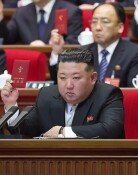S. Koreans put alliance with US before inter-Korean relations
S. Koreans put alliance with US before inter-Korean relations
Posted January. 02, 2021 08:04,
Updated January. 02, 2021 08:04
South Korean citizens pointed out the strengthening of the R.O.K.-U.S. alliance as the no. 1 issue for the government to deal with, according to a public poll commissioned by the Dong-A Ilbo and executed by Research & Research at the start of the year 2021. Asked what the most urgent diplomatic issue is under the Moon administration, 50.2 percent of respondents mentioned a stronger alliance with the U.S. while 17.5 percent chose the restoration of the inter-Korean relations.
Asked how the South Korean government should address the North’s denuclearization issues following the inauguration of U.S. President-elect Joe Biden, 37.8 percent said that it should join Washington’s sanctions against Pyongyang while 36.2 percent asked for its role in bridging Washington and Pyongyang at the negotiating table. 18.1 percent answered that Seoul should take an independent approach to inter-Korean cooperation. The new year’s poll among South Korean citizens demonstrates how they view the R.O.K.-U.S. alliance and solutions to North Korean nuclear issues.
Notably, strengthening alliance with the U.S. has earned a percentage three times higher than the restoration of the inter-Korean relations. While North Korean leader Kim Jong Un is expected to set a direction of this year at the 8th Labor Party Conference, South Korean citizens are already aware that the inter-Korean relations will make little improvement for the time being.
There is a huge gap in how the next U.S. administration by President-elect Joe Biden and the current Trump administration deal with the relations with Pyongyang. While the current U.S. administration only focuses on one-time events only for show, the Biden administration prefers a bottom-up approach starting from working-level talks to summit meetups. The next U.S. administration also emphasizes closer alliances with its allies such as Seoul and other types of multilateral approaches when handling North Korean nuclear issues.
Nevertheless, Seoul runs counter to where Washington is headed, for example, by moving forward with the ban on anti-Pyongyang leaflet campaigns despite concerns across the international community. Some experts warn that it will not only affect the R.O.K.-U.S. alliance but also put a dent in global cooperation on North Korean issues.
Seoul should make a swift response to its citizens’ call for a stronger R.O.K.-U.S. alliance. It should coordinate with Washington closely at every level to discuss pending issues such as the ban on leaflet campaigns against Pyongyang around the time President-elect Biden takes office. If necessary, it may be a good idea to plan a summit talk at an early time. In the Biden era, the strengthening of the R.O.K.-U.S. alliance can play a key role in bringing about stability on the Korean Peninsula and catalyzing improvements in the inter-Korean relations and the relationship between Japan and South Korea, both of which have been stuck in a deadlock.







